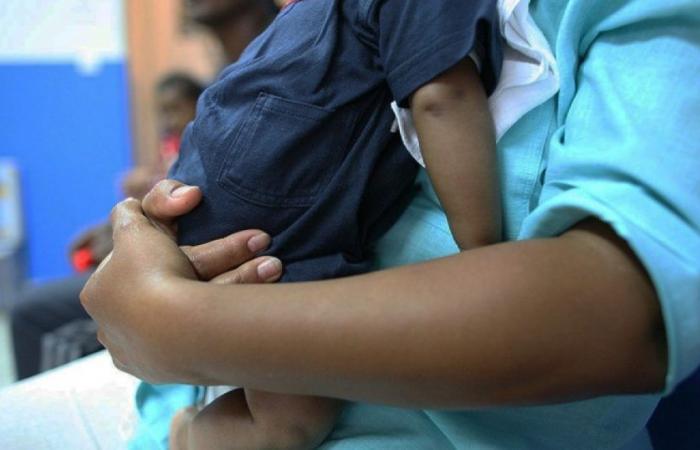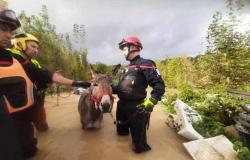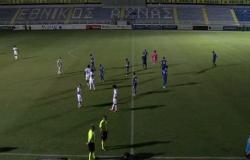In its weekly bulletin, Santé Publique France recalls that a flu epidemic is underway. Hospitalizations for bronchiolitis in children under two years of age also continue to increase. Whooping cough has a limited health impact which mainly affects infants and young children. No new cases of chikungunya detected. We publish the results below (Photo illustration rb/www.imazpress.com)
• Acute respiratory infection and influenza viruses
Visits to the emergency room due to influenza-like illness, despite a drop, remained at a high level in W40. In S40, emergencies recorded 62 visits for this reason versus 73 in S39. The number of hospitalizations fell sharply with only 5 hospitalizations compared to 17 the previous week. 60% of passages are attributable to the under 15 age group.
The share of emergency activity for influenza-like illness remained stable and represented 1.5% of total activity versus 1.7% the previous week.
In community medicine, Acute Respiratory Infections (ARI) increased with a 5.1% share of activity versus 4.6% in W39. The share of activity for IRA was above the 2013-2023 average.
• Bronchiolitis (in children under 2 years old)
Visits to the emergency room for bronchiolitis in children under 2 years of age decreased moderately in W40 compared to the previous week. In W40, 43 children aged under 2 years consulted the emergency room for bronchiolitis compared to 47 in W39.
New hospitalizations continued to increase (n=20) compared to the previous week (n=16). The share of visits to the emergency room for bronchiolitis among all visits of children under 2 years old remained stable with 11.0% of activity in W40 compared to 11.5% for W39
• Chikungunya
Since 08/23, several confirmed cases of indigenous chikungunya have been reported in Reunion. To date, 9 cases have been confirmed by PCR, all confirmed by the CNR. Among these cases, 7 are grouped together in an outbreak in Saint Gilles les Bains. At Ermitage, 2 cases were reported in the same neighborhood. These 2 cases are not linked to this outbreak.
The ARS vector control agents undertook measures around each of these cases to prospect for larval breeding sites, insecticide treatment, raise awareness and search for suspected cases in the area concerned in order to reduce the risk of infection. installation of an indigenous circulation.
Targeted information was also sent to all healthcare professionals.
The current period, the end of the southern winter, is characterized by a still limited vector density, but the arrival of conditions more favorable to vector activity encourages all stakeholders to be extremely vigilant.
In this context, we invite medical personnel to prescribe a biology allowing the confirmation or denial of the diagnosis in any patient who presents with a flu-like syndrome with joint pain.
The recommended diagnostic strategy is as follows:
PCR, to be carried out within the first 8 days, is the reference diagnostic test. Therefore, the patient should be encouraged to carry out confirmatory biology as soon as possible after the appearance of symptoms. Indeed, seroconversion (appearance of IgG in a second sample taken more than 10 days from the first) also makes it possible to confirm the infection but at a distance from the onset of symptoms.
As a reminder :
Between 2005 and 2006, Reunion experienced 2 successive epidemic waves of chikungunya virus infections, including one of massive scale in the summer of 2006. Data at the time estimated that 38% of the Reunion population had been affected by this epidemic (i.e. more than 250,000 cases in a population of 700,000 inhabitants at the time).
Traffic had affected the entire island – with the exception of Cilaos and the communes of Ste Rose and St Benoit, which were more modestly affected.
Since the infection is considered immunizing, it is reasonable to believe that residual but unquantified immunity exists in the population. However, caution is required: given the natural replacement (deaths, births & migrations) of part of the population in 18 years, the territory remains vulnerable to a potential epidemic.
• Whooping cough
– The increase in the number of reports to the ARS La Réunion by health professionals of isolated cases or grouped cases of whooping cough continues with a total of 29 reports since the start of 2024.
– Increase in positive samples at Bordella Pertussis in hospitals (only for the university hospital) with a total of 13 positive PCRs in 2024 versus 3 in 2023.
– For city laboratories, an increase since May in positive PCRs for Bordella Pertussis has been identified. Infants and young children represent 44% of Bordella Pertussis-positive PCRs.
For visits to the emergency room and even if the number of cases remains limited, a resurgence due to whooping cough is reported in 2023 compared to post-Covid-19 years with mainly children under 1 year old. However, the current level of traffic is not exceptional in Reunion. In 2014, 2015 and 2016, similar or even higher traffic levels were recorded on the island, with significant hospital impacts, particularly for emergency room visits and hospitalizations.
– In terms of severity, 5 infants were admitted to pediatric intensive care.
– No deaths have been reported.
Public Health France recalls the importance of vaccination in pregnant women, recommended since April 2022, to protect newborns and young infants.
– As of July 22, 2024, the High Authority of Health (HAS) recommended that any person in close contact with a newborn and/or infant under 6 months in a family or professional setting receive a booster against whooping cough if the last vaccination was more than 5 years ago – Information.
– The High Council of Public Health (HCSP) issued recommendations on August 12, 2024 relating to the prevention of its transmission in people at high risk and at risk of a serious form of the disease – Information.
Whooping cough is not a notifiable disease but must be reported to the ARS Indian Ocean health monitoring and emergencies platform in 2 specific situations:
– Occurrence of grouped cases (from 2 cases).
– Reporting of nosocomial infections (prevent EOH and E-Sin reporting)
The minimum number of cases to intervene is 1 case.
Given the current context of whooping cough circulation in Reunion Island and insufficient vaccination coverage, particularly for boosters, any case, even isolated, must be reported by health professionals to:
– Prevention measures –
Prevention of whooping cough, in addition to wearing a mask, involves:
– Vaccination
The vaccination policy against whooping cough in France aims to reduce severe forms, hospitalizations and deaths linked to whooping cough which mainly occur in infants under 6 months of age. It is based on three complementary strategies (professionals, general public):
• Vaccination is compulsory for infants born from January 1, 2018 at the age of 2 months, 4 months with boosters at 11 months, 6 years and 11-13 years and until adulthood (25 years with possibility of catching up until age 39).
• Vaccination is strongly recommended for pregnant women, from the second trimester of pregnancy, favoring the period between 20 and 36 weeks of amenorrhea.
Vaccination is also recommended in:
• Immunocompromised people, healthcare professionals (including in accommodation establishments for dependent elderly people (Ehpad), people working in close and repeated contact with infants aged less than 6 months, medical students and paramedics, early childhood professionals including childminders and people who regularly babysit,
Among health and early childhood professionals, reminders of 25, 45 and 65 years of age must now include the pertussis valence.
News from Reunion Island, Public health, Report






